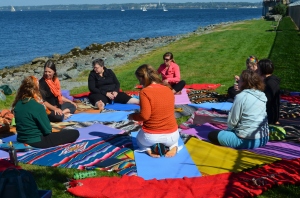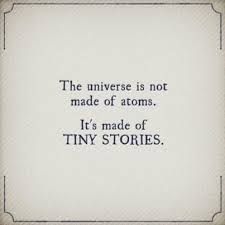Conflict instigated the writing of Cut From the Earth. Real life drama. Family drama. Like good fiction riddled with problems that move the story forward, conflict, literally spurred me from my comfortable hammock, thrust me to sea in an open dory, rowing without life jacket along Brazil’s southern coast, and into writing a novel. Moments before leaving land — providence — I threw in the boat the book Your First Novel by Ann Rittenberg and Laura Whitecomb; a writing book that I had been packing around the world and had yet to follow its advice and instruction.
What conflict started a 40-day sea journey, the opening of that book, and pen to paper?
I was attacked by my husband’s younger brother — accused of lying and sabotage.
Why? Because I told the truth when asked by the brother’s, now, ex-partner, of any strange behavior I’d witnessed while she was away from Brazil in France. She being French and I being American, both involved with Brazilian fishermen brothers, along with my fondness for her, I told her the only thing I knew for sure about her partner’s actions in her absence: How he had invited me into their place, late one night, while I sat at an open window writing as my husband slept nearby.
“Do you want to come in?” he had said suggestively with a devilish smile, looking to his door.
I knew he was drunk or under the influence of something, and I had heard it was not uncommon in Brazilian culture to be hit-on by brothers in the family; a show of one ups’em ship, the demonstration of ones prowess over another. So, I was not totally caught off guard by the invitation. I declined. I went to bed. In the morning I mentioned the incident to my husband, he shrugged it off as if not surprised nor threatened by it. I too did not take it to heart, but found it interesting from an anthropologically point of view. I left it at that. When I shared the story with my friend, I never thought I would become involved in their matters as nothing actually happened. I had written the suggestive approach off as an ignorant drunken offer that could not be taken seriously.
But in a heated argument between the couple, the brother, in a fit of desperation, and I assume drunken or drugged rage, burst into our abode and accused me of lying and trying to ruin their already tainted love story. For their romance was singeing on hot rocks of a previous betrayal of his. Now, after reflecting, I am not surprised he reacted as he did when she brought up the incident to him, as I believe he doesn’t remember what he said to me that proposition night, nor was he aware of his body language because of his altered state. A novella style argument ensued, ending with me and my husband fleeing our small coastal town, to protect our relationship from their disintegrating one. And to actualize a long dreamed of trip of my husband’s — to camp and explore the little visited islands along Brazil’s southern coast.
We left the drama of the mainland and set to explore the uninhabited tropical islands.
The traumatic event thrust open the space for me to begin writing Cut From the Earth, a story that had been brewing for years. The moment manifest of long quiet days with nothing begging of our time but feeding ourselves, seeking out ancient hieroglyphics, and enjoying the peace and wild of the islands and sea. Idle time. Open time. Time without demands. Time without constraints. I wrote 70 pages of Cut From the Earth under swaying palms, by headlamp in our tent during tropical night storms, in the ion charged ocean mist as waves crashed on the island rocks, and at smoky fires repelling the swarming insects. The novel’s story came forth into the hot humid air as my own steam of the past events simmered. And the experience of rowing an open dory on the Atlantic, life jacket less, rang a tune of old sea times of my husband’s forefathers in the eighteenth century while they explored and settled the Brazilian coast: the time period of my story. Conflict, oh sweet conflict! How you prod and push us into ourselves and our dreams, forcing us forward, to look for solutions to our problems, for sometimes it takes an out-of-the-ordinary event to release us onto our desired path.
Conflict the substance of epic tales and the kick-starter for the realizing of Cut From the Earth.
![]() Fortitude.
Fortitude. ![]() Click this photo & connect with the Writing Resolution Blog Hop! Organized by author Meg Waite Clayton.
Click this photo & connect with the Writing Resolution Blog Hop! Organized by author Meg Waite Clayton.

![lalitamba_journal2[1]](http://www.stephaniereneedossantos.com/wp-content/uploads/2012/07/lalitamba_journal21.jpg)
